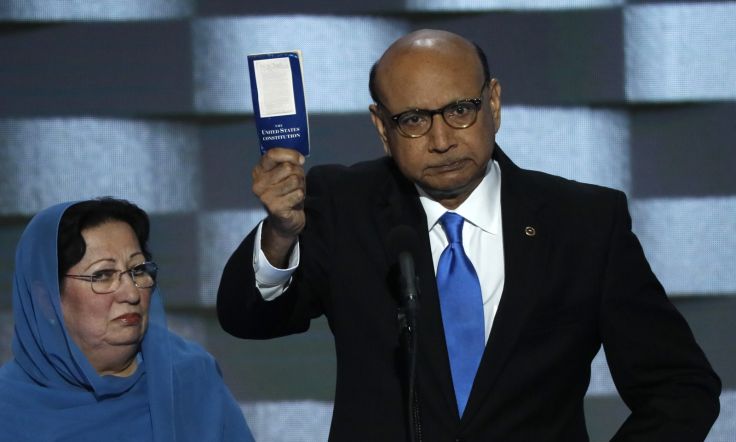Like this article? rabble is reader-supported journalism. Chip in to keep stories like these coming.
“Have you even read the U.S. Constitution?” The words shot out from Khizr Khan as the crowd roared at the Democratic National Convention only to be outdone by his unconventional yet immensely effective tactic of pulling out a pocket constitution for the world to see.
I observed that moment both with a sense of pride and, admittedly, some laughter as an unassuming immigrant who had lost his son to war challenged the prejudices of a presidential nominee.
But my strongest feeling that night in hearing Mr. Khan speak and perhaps the most profound takeaway from his address was not his courage, his simple eloquence or his radiating sincerity — it was his unabated patriotism and insistence on defending the laws and principles set out in the U.S. Constitution.
I saw in him what I have seen my entire life from my own parents, themselves immigrants from Pakistan similar to the Khans, of pride in their adopted country and a call to defend its multicultural tenets, whether against outsiders or, at times, their fellow citizens.
Having lost my father lately, I have become forlorn to a sense of nostalgia. As long as I remember, my parents have been devoted Liberal Party members, touting the virtues of the senior Trudeau government’s openness to accepting immigrants and assisting refugees flee persecution.
I grew up during arguably another Liberal “golden era,” the three majority victories of Jean Chrétien. My parents avidly followed Canadian politics and every night together we watched the CBC Nightly News. As an adult, I inherited the same interests in western politics and current affairs as I was so used to seeing in my parents.
Growing up I rarely heard stories relating to Pakistani or Indian history or its politicians, some of whom are also to be revered. Rather, I learned how Richard Nixon, who grew up poor, put himself through law school and eventually became president; or how Robert Kennedy was the real political star of his family, fighting for the common man first as a senator and eventually as U.S. Attorney General before being assassinated in his prime; or how Pierre Trudeau would stop and charm the average citizen on his way to the House of Commons; or how Brian Mulroney, who was born to humble beginnings, eventually became a successful lawyer and businessperson before becoming our country’s 18th Prime Minister.
I knew my father told me those stories, in part, to inspire in me the same ambition to become like the protagonists of his political tales. He undoubtedly had in mind that if those people could go from seemingly humble beginnings to leaders of government as a result of the basic principle of our democracy that each of us is equal under the law, his son could enjoy a similar ascent. I am convinced that my father’s influence and the stories he told my sister and I growing up played a strong role in my own decision as an adult to become a lawyer.
To this day, I recall being at the Osgoode Hall subway station as my dad and I dropped my sister off for her freshman year at the University of Toronto. I remember him telling me that Osgoode Hall was a prestigious law school that I could attend one day. So it was fitting that some 10 years later when I was accepted to study law there, he was the first person I called.
All of this is not so much to relay my own experience but rather the experience of many immigrants who see the values of our liberal democracy as according with their own. The story of my parents and of the Khans is the story of so many immigrants who come to Canada or the U.S.
This is precisely the reason why Americans, at large, have been repelled by Donald Trump’s anti-immigrant message or why Canadians rejected anti-immigrant rhetoric in our own federal election last year. A “barbaric cultural practices” hotline or increased scrutiny of Muslim immigrants or laws telling people how to dress or how best to practice their faith remains incongruous with the constitutional values our leaders from both sides of the political aisle have sought to profess for decades.
As the celebrated thinker Hannah Arendt noted, migrants have been a “vanguard of history,” not only witnesses, but also an integral aspect of the changing architecture of politics. While there will always remain a group of immigrants unwilling to accept the precepts of their adopted countries, now more than ever we see that immigrants, even occasionally to a greater degree than Canadian-born individuals, demonstrate a more poignant expression of citizenship that not only seeks to defend their right to belong within these societies but to champion the very values that form the backbone of our societal structure.
Their desire to contribute to Canadian society and continue defending these values has endured despite persistent and, recently, heightened tension and scrutiny. The story of the Khans and my parents was, at one time or another, all of our stories. It is these stories that I will tell to my own children, just as my father told me.
Hassan M. Ahmad is a Canadian lawyer currently working at the International Criminal Court in The Hague, Netherlands.
Like this article? rabble is reader-supported journalism. Chip in to keep stories like these coming.



